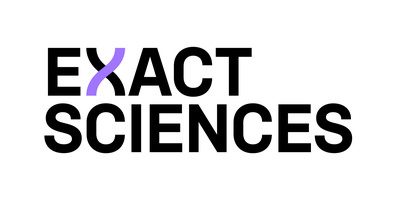Exact Sciences Applauds Final Task Force Recommendation That Lowers Starting Age for Colorectal Cancer Screening to 45
Exact Sciences (NASDAQ: EXAS) celebrates the USPSTF's recommendation for colorectal cancer screening to begin at age 45. Cologuard, their FDA-approved stool DNA test, is endorsed for average-risk patients aged 45-75. The recommendation addresses the increase in colorectal cancer incidence among younger adults. With 44 million eligible adults, Cologuard's inclusion in guidelines aims to enhance screening rates. It has successfully detected 92% of colorectal cancers in studies. This change could elevate healthcare provider discussions on screening options and expand Cologuard's market impact.
- Cologuard is included in USPSTF guidelines for colorectal cancer screening for ages 45-75.
- The recommendation addresses the increasing colorectal cancer rates in younger adults.
- Cologuard detected 92% of colorectal cancers in studies, showcasing its effectiveness.
- Over 5 million Americans have been screened using Cologuard since its recommendation in 2016.
- None.
Insights
Analyzing...
MADISON, Wis., May 18, 2021 /PRNewswire/ -- The United States Preventive Services Task Force (USPSTF) today released its final colorectal cancer screening recommendation that screening begin at age 45. Exact Sciences' (NASDAQ: EXAS) Cologuard®, referred to as sDNA-FIT, is included as a recommended screening option for all average-risk patients between the ages of 45 and 75.
Colorectal cancer is the second leading cause of cancer death in the United States, in part because many cancers go undetected until later stages when treatment options are limited.1 Colorectal cancer can be prevented or detected early through screening. However, approximately 44 million average-risk adults 45-74 are currently eligible for screening, including ˜19 million between the ages of 45 and 49.2§
According to this updated recommendation, all average-risk adults age 45 and older should now be screened for colorectal cancer. Colorectal cancer incidence has been increasing in American adults under the age of 50.3 Between 2004 and 2015, health care providers diagnosed more than 130,000 cases of colorectal cancer in Americans under age 50.4 More than half of these cases were diagnosed at later stages (stages III or IV), which are associated with lower survival rates than earlier stages (stages I or II).4 Only about one out of 10 people over the age of 50 with stage IV colorectal cancer survives beyond five years.1
"Health care providers often turn to the USPSTF guidelines when discussing cancer prevention with their patients," said Paul Limburg, M.D., Chief Medical Officer, Screening at Exact Sciences. "These final guidelines will encourage more clinicians to offer colorectal cancer screening to their patients starting at age 45."
Cologuard is a U.S. Food & Drug Administration (FDA)-approved non-invasive stool DNA test used to screen for colorectal cancer in average risk patients. In a large clinical study of nearly 10,000 patients 50 and older, Cologuard found
A recent study showed that among average-risk adults between the ages of 45 and 49, Cologuard demonstrated test specificity of
USPSTF guidelines play a key role in addressing the public health crisis caused by colorectal cancer. Under these final guidelines, colorectal cancer screening remains a Grade A recommendation for people ages 50-75 and screening for ages 45 to 49 is a Grade B recommendation. The task force continues to include Cologuard (referred to in the guidelines as sDNA-FIT) among the recommended screening test options. Since it was first included in the 2016 USPSTF recommendation, Cologuard has been used to screen more than 5 million Americans.
"We are proud of the role Cologuard has played in getting more people screened for colorectal cancer," said Kevin Conroy, chairman and CEO of Exact Sciences. "The task force's recommendation that colorectal cancer screening begin at age 45 for all average risk people means that Cologuard can continue to positively impact screening rates as people work with their healthcare providers to choose the option that is right for them."
Making sure people have full access to using stool-based tests like Cologuard is critical to reaching the unscreened. A recent study conducted by researchers at Mayo Clinic showed that when given a choice, most individuals at average risk of colorectal cancer said they would prefer a stool-based screening test for colorectal cancer over colonoscopy.8
*Statistic calculated using data from the pivotal study and reported within the Ahlquist review article. Cologuard sensitivity, per stage of cancer: I:
§ Estimates based on US population aged 45-74 and 45-49 as of 2018, adjusted for the reported rates of high-risk conditions and prior screening history for CRC.
1 Siegel RL, Miller KD, Fuchs HE, Jemal A. Cancer statistics, 2021. CA Cancer J Clin. 2021;71:7-33. doi:10.3322/caac/21654
2 Piscitello A, Edwards DKV. Estimating the screening-eligible population size, aged 45 to 74, at average risk to develop colorectal cancer in the United States. Cancer Prev Res. 2020;13(5):443-448. doi:10.1158/1940-6207.CAPR-19-05
3 Wolf A, Fontham E, Church TR, et al. Colorectal cancer screening for average-risk adults: 2018 guideline update from the American Cancer Society. CA Cancer J Clin. 2018;68:250-281. doi:10.3322/caac.21457
4 Virostko J, Capasso A, Yankeelov TE, et al. Recent trends in the age at diagnosis of colorectal cancer in the US National Cancer Data Base, 2004-2015. Cancer. 2019;25(21):3828-3835. doi:10.1002/cncr.32347
5 Imperiale TF, Ransohoff DF, Itzkowitz SH, et al. Multitarget stool DNA testing for colorectal-cancer screening. N Engl J Med. 2014;370(14):1287-1297. doi:10.1056/NEJMoa1311194
6 Ahlquist DA. Multi-target stool DNA test: a new high bar for non-invasive screening. Dig Dis Sci. 2015;60(3):623-633. doi:10.1007/s10620-014-3451-5
7 Cologuard Physician Brochure. Exact Sciences Corporation. Madison, WI.
8Imperiale TF, Kisiel JB, Itzkowitz SH, et al. Specificity of the Multi-Target Stool DNA Test for Colorectal Cancer Screening in Average-Risk 45–49 Year-Olds: A Cross-Sectional Study. Cancer Prev Res. 2021;14(4):489-496. doi: 10.1158/1940-6207.CAPR-20-0294
9Zhu X, Parks PD, Weiser E. National Survey of Patient Factors Associated with Colorectal Cancer Screening Preferences. Cancer Prev Res. 2021;14(5):603-614. doi: 10.1158/1940-6207.CAPR-20-0524
Media Contact:
Cara Connelly, cconnelly@exactsciences.com, 614-302-5622
Investor Contact:
Megan Jones, meganjones@exactsciences.com, 608-535-8815
About Exact Sciences Corp.
A leading provider of cancer screening and diagnostic tests, Exact Sciences relentlessly pursues smarter solutions providing the clarity to take life-changing action, earlier. Building on the success of Cologuard and Oncotype DX ®, Exact Sciences is investing in its product pipeline to take on some of the deadliest cancers and improve patient care. Exact Sciences unites visionary collaborators to help advance the fight against cancer. For more information, please visit the company's website at www.exactsciences.com, follow Exact Sciences on Twitter @ExactSciences, or find Exact Sciences on Facebook
About Cologuard
Cologuard was approved by the FDA in August 2014, and results from Exact Sciences' prospective 90-site, point-in-time, 10,000-patient pivotal trial in adults 50 years of age or older were published in the New England Journal of Medicine in March 2014. Cologuard is included in the American Cancer Society's (2018) colorectal cancer screening guidelines and the recommendations of the U.S. Preventive Services Task Force (2016) and National Comprehensive Cancer Network (2016). Cologuard is indicated to screen adults 45 years of age and older who are at average risk for colorectal cancer by detecting certain DNA markers and blood in the stool. Do not use Cologuard if you have had precancer, have inflammatory bowel disease and certain hereditary syndromes, or have a personal or family history of colorectal cancer. Cologuard is not a replacement for colonoscopy in high-risk patients. Cologuard performance in adults ages 45-49 is estimated based on a large clinical study of patients 50 and older. Cologuard performance in repeat testing has not been evaluated.
The Cologuard test result should be interpreted with caution. A positive test result does not confirm the presence of cancer. Patients with a positive test result should be referred for a follow-up colonoscopy. A negative test result does not confirm the absence of cancer. Patients with a negative test result should discuss with their doctor when they need to be tested again. Medicare and most major insurers cover Cologuard. For more information about Cologuard, visit www.cologuard.com. Rx Only.
Forward-Looking Statements
This news release contains forward-looking statements concerning our expectations, anticipations, intentions, beliefs or strategies regarding the future. These forward-looking statements are based on assumptions that we have made as of the date hereof and are subject to known and unknown risks and uncertainties that could cause actual results, conditions and events to differ materially from those anticipated. You should not place undue reliance on forward-looking statements. Risks and uncertainties that may affect our forward-looking statements are described in the Risk Factors sections of our most recent Annual Report on Form 10-K and any subsequent Quarterly Reports on Form 10-Q, and in our other reports filed with the Securities and Exchange Commission. We undertake no obligation to publicly update any forward-looking statement, whether written or oral, that may be made from time to time, whether as a result of new information, future developments or otherwise.
![]() View original content to download multimedia:http://www.prnewswire.com/news-releases/exact-sciences-applauds-final-task-force-recommendation-that-lowers-starting-age-for-colorectal-cancer-screening-to-45-301294436.html
View original content to download multimedia:http://www.prnewswire.com/news-releases/exact-sciences-applauds-final-task-force-recommendation-that-lowers-starting-age-for-colorectal-cancer-screening-to-45-301294436.html
SOURCE EXACT SCIENCES CORP








